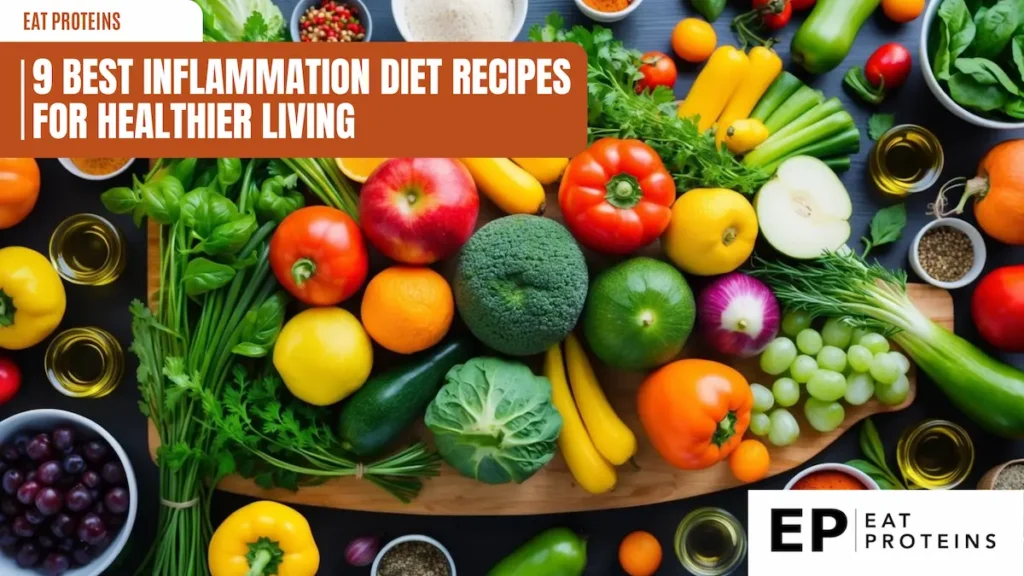
I often explore ways to improve health through diet, and one topic that stands out is inflammation. Many people deal with various forms of inflammation, which can lead to health issues over time. Eating the right foods can help reduce inflammation and support overall wellness.
In my journey, I have come across numerous recipes that not only taste great but also emphasize ingredients known for their anti-inflammatory properties. These recipes can easily fit into daily meal plans, making healthy eating both enjoyable and accessible.
1. Turmeric Lentil Soup
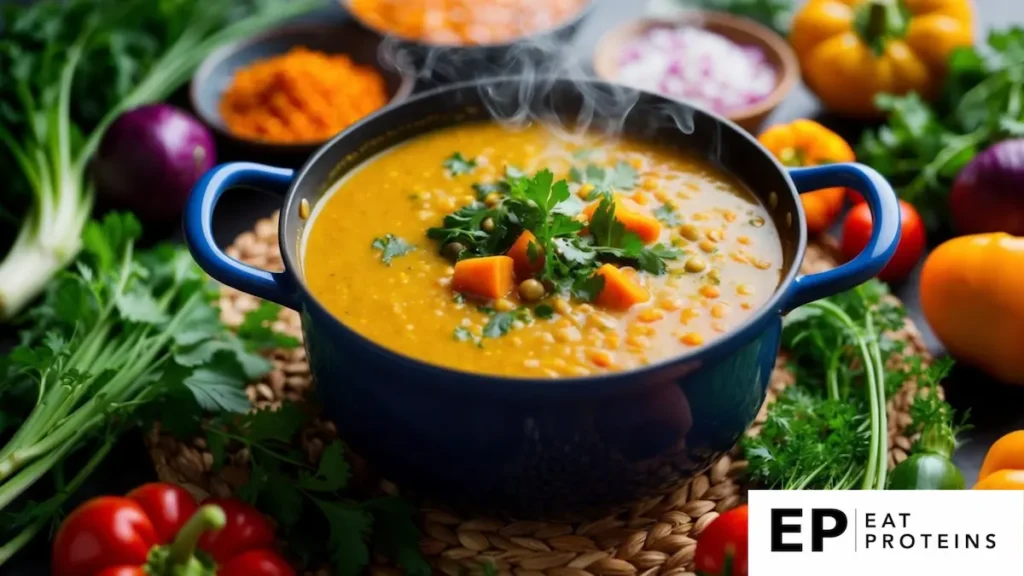
Turmeric lentil soup is a nutritious and comforting dish. It combines lentils with turmeric, known for its anti-inflammatory properties. This soup is easy to make and is perfect for a healthy meal.
To prepare the soup, I start by gathering the ingredients: lentils, turmeric, vegetable broth, onions, garlic, and spices. Cooking this soup requires minimal effort and time.
Here are the steps I follow:
- In a pot, I heat olive oil and sauté 1 chopped onion and 2 minced garlic cloves until soft.
- I add 1 teaspoon of turmeric and stir for about 1 minute to release its flavor.
- Next, I add 1 cup of rinsed lentils and 4 cups of vegetable broth.
- I bring the mixture to a boil, then reduce the heat and let it simmer for 20-25 minutes.
- Finally, I season with salt and pepper to taste.
This turmeric lentil soup is not only tasty but also packed with nutrients. It’s quick to make and perfect for any day of the week.
2. Quinoa and Veggie Stir-Fry
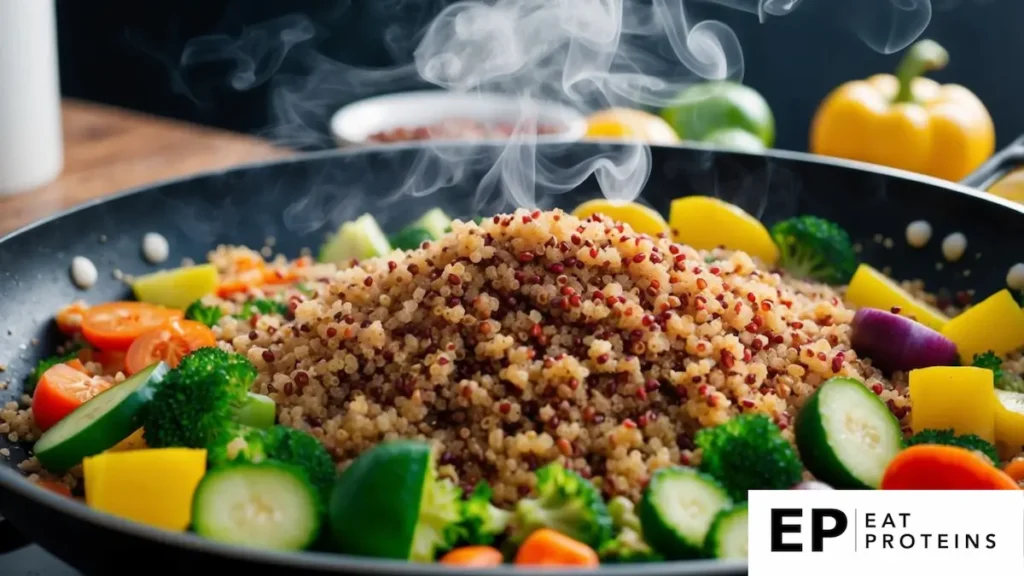
Quinoa is a protein-packed grain that is known for its anti-inflammatory benefits. It is gluten-free and full of essential amino acids. This makes it a great choice for anyone looking to improve their diet.
Making a quinoa and veggie stir-fry is simple and quick. I appreciate how versatile it is, allowing me to mix various vegetables.
Here are the steps I follow:
- Rinse 1 cup of quinoa under cold water.
- Cook quinoa according to package instructions, usually 15 minutes.
- Meanwhile, chop 1 cup of mixed vegetables like bell peppers, broccoli, and carrots.
- Heat 2 tablespoons of olive oil in a pan over medium heat.
- Add the vegetables and stir-fry for about 5-7 minutes until tender.
- Stir in the cooked quinoa and season with salt, pepper, and any herbs I like.
In less than 30 minutes, I have a healthy, filling meal that supports my well-being. Quinoa and veggie stir-fry can be enjoyed on its own or alongside a protein source.
3. Chia Seed Pudding
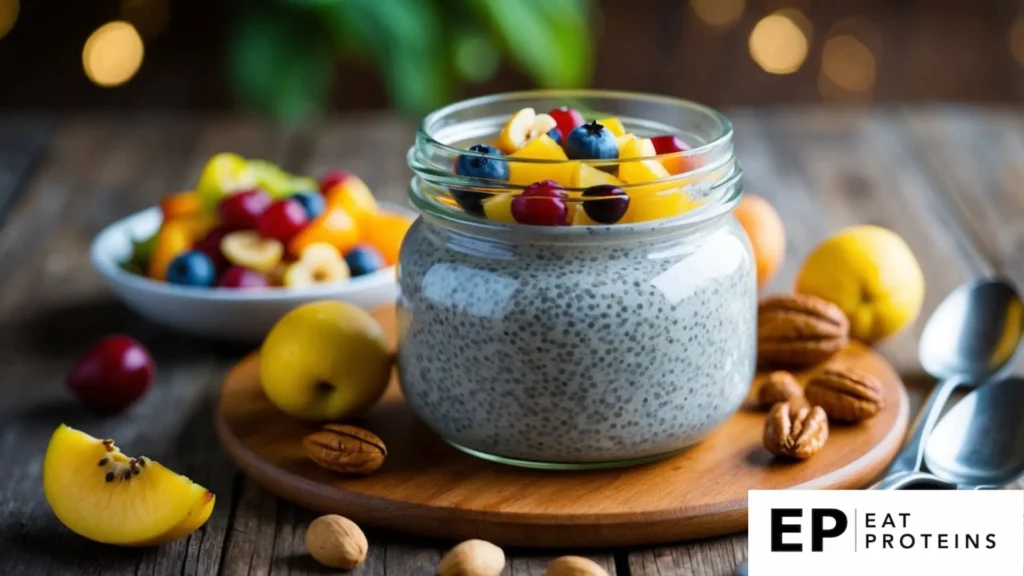
Chia seed pudding is a simple and nutritious dish that I enjoy. Chia seeds are tiny black seeds from the Salvia hispanica plant. They are rich in omega-3 fatty acids, fiber, and proteins, making them a great addition to an anti-inflammatory diet.
Making chia seed pudding is very easy. I usually prepare it the night before, so it’s ready for breakfast. Here’s how I do it:
- In a bowl, I mix 1/4 cup of chia seeds with 1 cup of plant-based milk, like almond or coconut milk.
- I add 1 tablespoon of sweetener, such as maple syrup or honey, if desired.
- Then, I stir the mixture well to prevent clumping.
- I cover the bowl and place it in the refrigerator for at least 4 hours or overnight.
The chia seeds absorb the liquid and create a thick, pudding-like texture. When I’m ready to eat, I top it with fruits like berries or sliced bananas for added flavor and nutrients. This pudding is not only easy to make, but it is also filling and satisfying.
4. Salmon and Avocado Salad
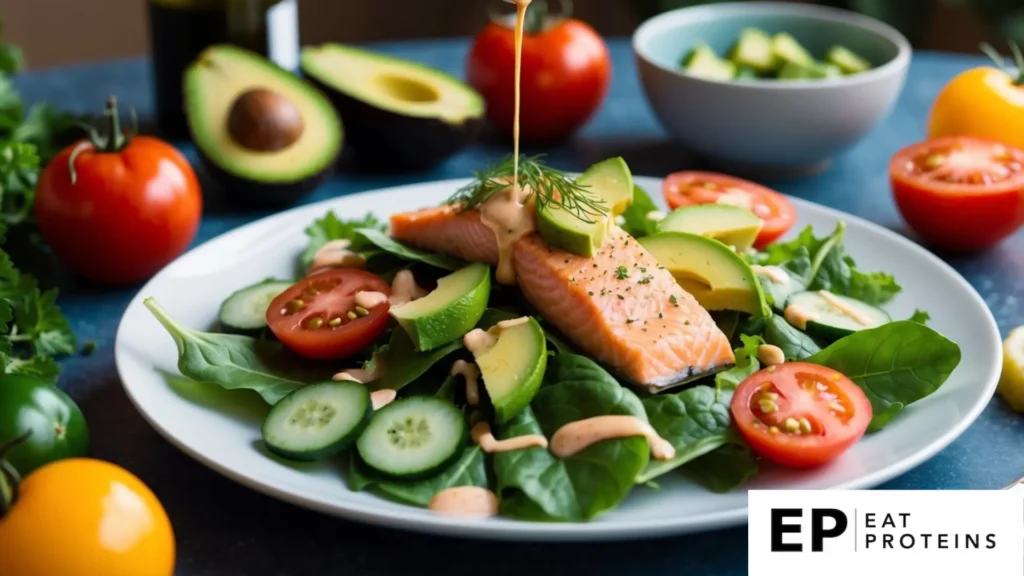
Salmon and avocado salad is a healthy dish packed with nutrients. Salmon is rich in omega-3 fatty acids, which can help reduce inflammation. Avocados add healthy fats and fiber.
Making this salad is easy and quick. I enjoy preparing it for lunch or dinner. Here are the steps:
- Start with fresh, cooked salmon. I prefer grilling or baking it.
- Chop one ripe avocado into cubes.
- Dice half a cucumber and one medium tomato.
- Add a handful of mixed greens to a bowl.
- Flake the salmon on top of the greens.
- Mix in the avocado, cucumber, and tomato.
- Drizzle with olive oil and lemon juice for flavor.
- Season with salt and pepper to taste.
This salad is not only simple to make, but it also tastes great. It’s a perfect meal that supports a balanced diet and helps with inflammation.
5. Beetroot Hummus
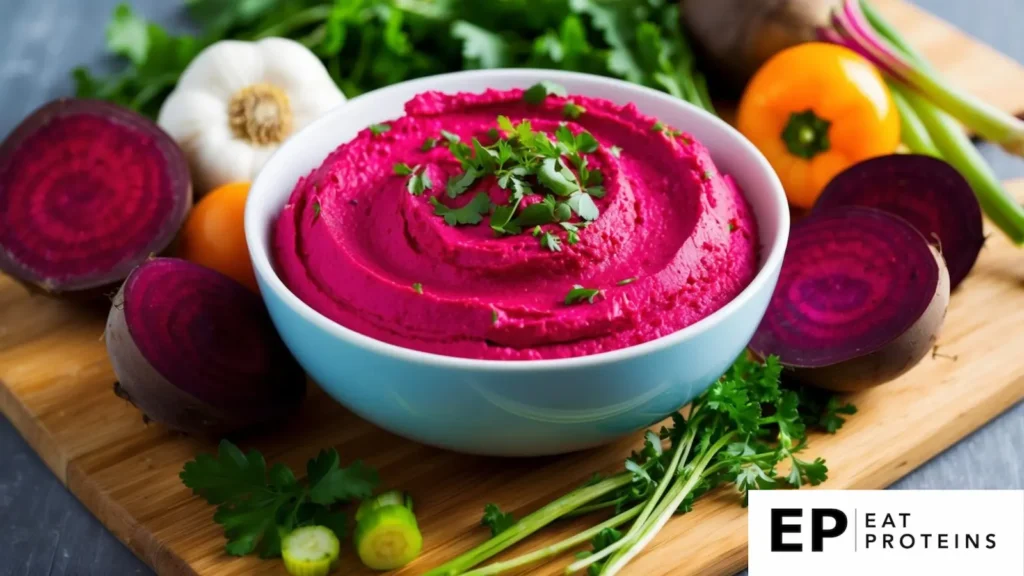
Beetroot hummus is a delicious dip that combines the earthiness of beets with the creaminess of chickpeas. It’s a great option for an anti-inflammatory diet. The vibrant color is appealing and it offers health benefits.
Making beetroot hummus is simple and quick. I can prepare it in about 15 minutes. Here are the steps I follow:
- Ingredients: I gather 1 medium beetroot, 1 can of chickpeas, 2 tablespoons of tahini, the juice of 1 lemon, and 1 clove of garlic.
- Cook the Beet: I peel and chop the beetroot, then boil it for about 20 minutes until tender. Alternatively, I can roast it for deeper flavor.
- Blend: After cooling, I combine the beet with chickpeas, tahini, lemon juice, and garlic in a food processor.
- Adjust Consistency: I add water or olive oil if needed to reach my preferred consistency.
- Serve: I transfer the hummus to a bowl and drizzle olive oil on top for extra flavor.
This recipe not only tastes great but also provides nutrients that support my health. Enjoy it with vegetables or whole grain pita.
6. Green Smoothie with Spinach
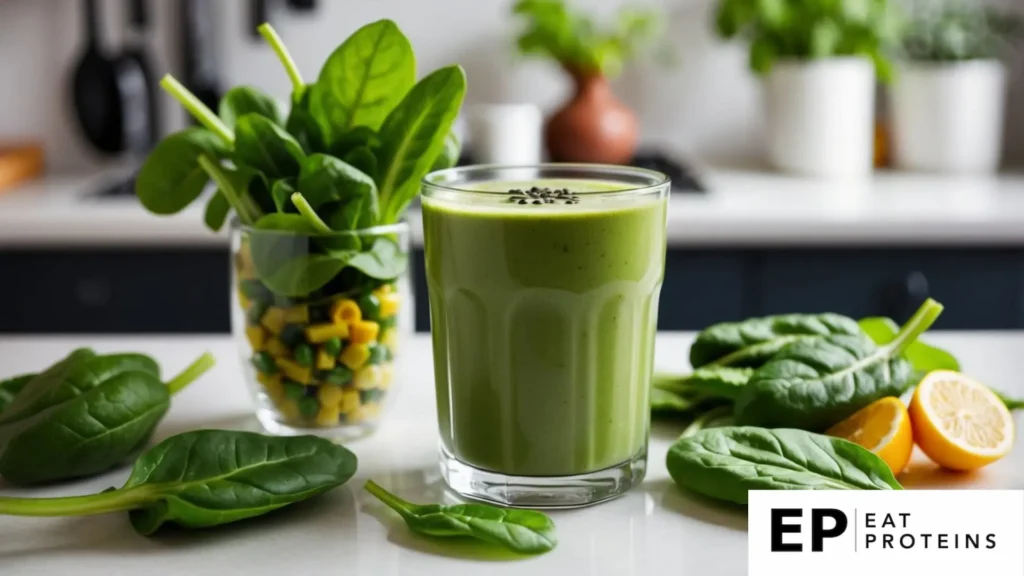
A green smoothie with spinach is a nutritious drink that helps reduce inflammation in the body. Spinach is packed with vitamins and antioxidants that can support overall health.
Making this smoothie is quick and easy. I can prepare it in just a few minutes. Here’s how I make it:
- Gather your ingredients: 1 cup of fresh spinach, 1 banana, 1 cup of almond milk, and 1 tablespoon of honey.
- Rinse the spinach thoroughly under cold water.
- In a blender, combine the spinach, banana, almond milk, and honey.
- Blend until smooth, ensuring there are no chunks remaining.
- Pour it into a glass and enjoy!
This smoothie is a great way to start my day. It provides energy and is simple to make. Plus, it’s an easy way to add greens to my diet without hassle.
7. Dark Leafy Greens Salad
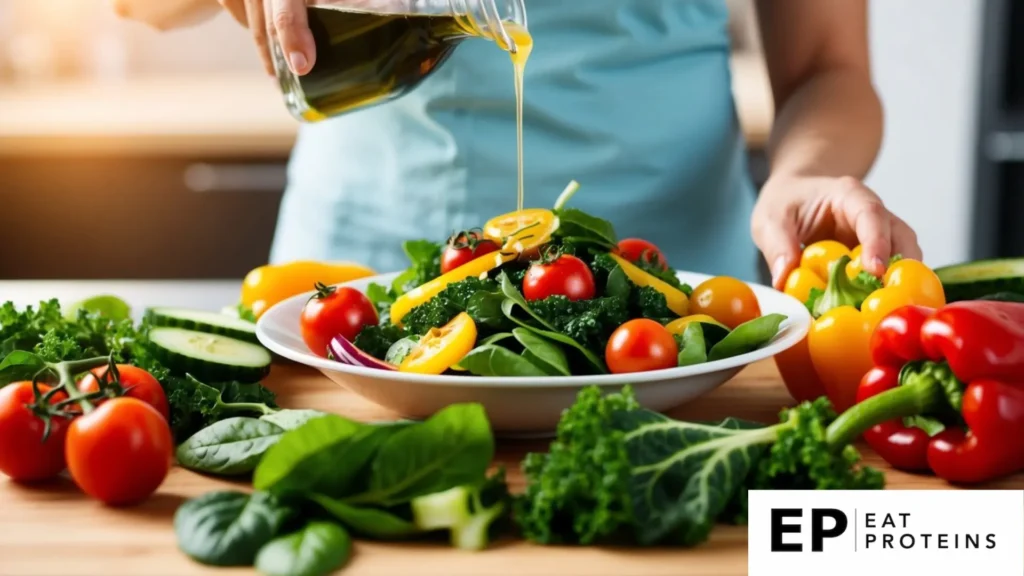
Dark leafy greens are nutrient-rich vegetables that are excellent for fighting inflammation. They include spinach, kale, and Swiss chard. These greens are low in calories and loaded with vitamins and minerals.
Making a dark leafy greens salad is easy. I often prepare it in just a few minutes. Here’s how I do it:
- Wash: Start by rinsing about 2 cups of dark leafy greens under cold water.
- Chop: Tear or chop the greens into bite-sized pieces.
- Add Veggies: I like to add cherry tomatoes, cucumbers, or bell peppers for extra flavor. Use about 1 cup of mixed veggies.
- Dress: Drizzle with olive oil and balsamic vinegar. About 2 tablespoons of oil and 1 tablespoon of vinegar works well.
- Season: I sprinkle in salt and pepper to taste.
This salad is versatile and can be customized with nuts, seeds, or fruit for added texture. It’s a quick and delicious way to boost my anti-inflammatory diet while enjoying fresh flavors.
8. Ginger Carrot Soup
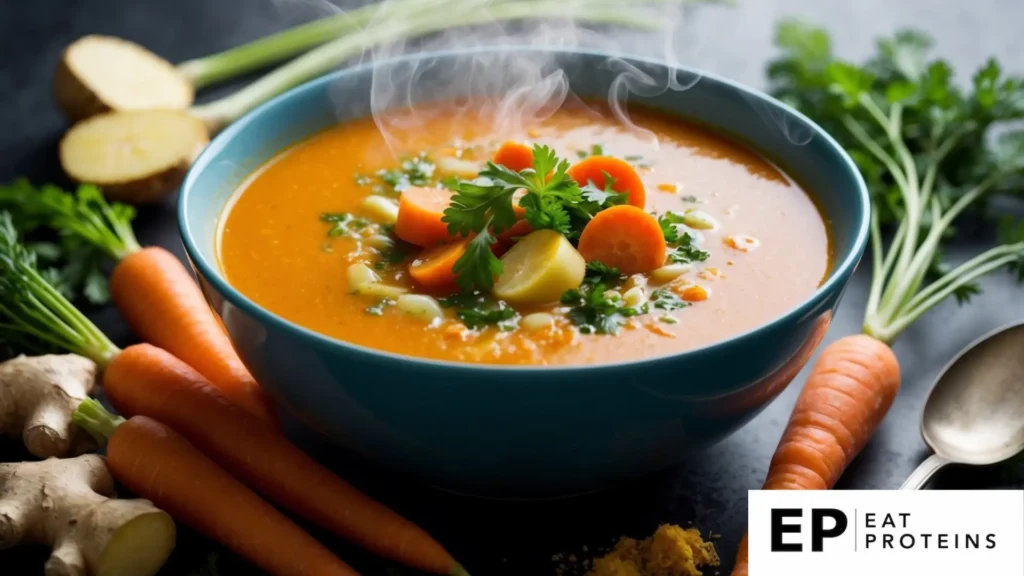
Ginger Carrot Soup is a nutritious and flavorful dish that helps fight inflammation. Carrots are rich in beta-carotene, and ginger has antioxidant properties. Together, they create a warm and comforting soup.
I find this recipe easy to make. It requires only a few simple ingredients. Here’s how I prepare it:
- Start by peeling and chopping 4 large carrots.
- Dice 1 medium onion and mince 2 cloves of garlic.
- Heat 2 tablespoons of olive oil in a pot over medium heat.
- Add the onion and garlic, cooking until soft, about 5 minutes.
- Add the carrots and 1 tablespoon of grated ginger, cooking for another 3 minutes.
- Pour in 4 cups of vegetable broth and bring to a boil.
- Reduce the heat, cover, and let simmer for 20 minutes until the carrots are tender.
- Blend the soup until smooth and season with salt and pepper to taste.
This soup is not only simple but also delicious. I enjoy it as a light meal or as a comforting starter.
9. Walnut and Flaxseed Muffins
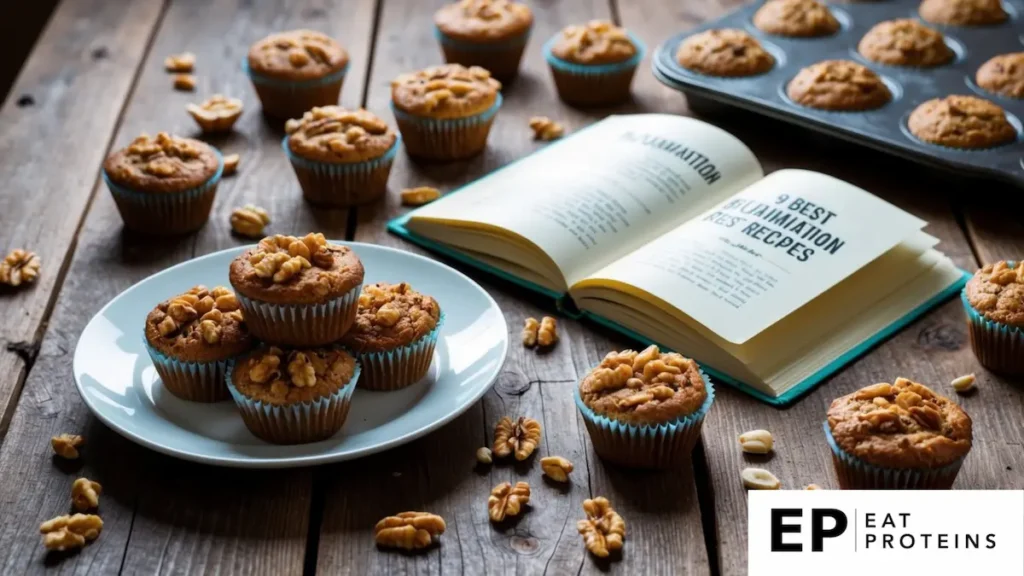
Walnut and flaxseed muffins are a delicious way to include anti-inflammatory ingredients in my diet. Walnuts provide healthy fats, while flaxseeds are rich in omega-3 fatty acids and fiber. These muffins are not only tasty but also easy to make.
To prepare these muffins, I typically follow these simple steps:
- Preheat my oven to 350°F (175°C).
- In a bowl, I mix 1 cup of whole wheat flour, 1/2 cup of ground flaxseed, and 1/4 cup of sugar.
- I then add 1 teaspoon of baking powder, 1/2 teaspoon of baking soda, and a pinch of salt.
- Next, I stir in 1 cup of milk and 1/4 cup of melted coconut oil.
- Finally, I fold in 1/2 cup of chopped walnuts.
After mixing, I pour the batter into a muffin tin and bake for about 20-25 minutes. I check if they are done by inserting a toothpick; it should come out clean.
These muffins make a great snack or breakfast option that’s both nutritious and satisfying.
What Is Inflammation?
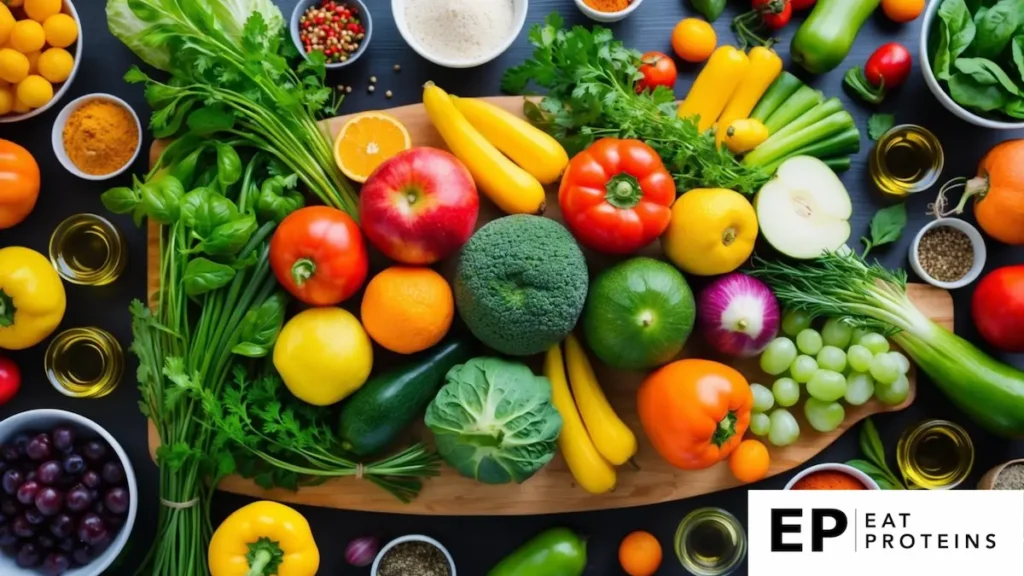
Inflammation is a natural response by the body’s immune system. It can be helpful for healing but may become harmful when it becomes chronic. I will explain what inflammation is and the main causes of chronic inflammation.
Inflammation is the body’s way of protecting itself. When I get hurt or sick, my immune system sends white blood cells and other substances to the affected area. This causes redness, swelling, and heat, which are signs of inflammation.
There are two types of inflammation: acute and chronic. Acute inflammation occurs suddenly and is usually short-lived. It helps the body heal injuries or fight infections. Chronic inflammation, on the other hand, lasts for months or years and can lead to various health issues.
Understanding inflammation is important because it plays a role in many diseases, including heart disease and diabetes. I need to be aware of factors that can make inflammation worse.
What Are the Causes of Chronic Inflammation?
Chronic inflammation can arise from several factors in my life and environment. Here are some common causes:
- Poor Diet: A diet high in sugar, processed foods, and unhealthy fats can trigger inflammation.
- Sedentary Lifestyle: Lack of physical activity can contribute to inflammation over time.
- Stress: Chronic stress affects my body’s ability to regulate inflammation.
- Infections: Some infections may cause ongoing inflammation if the body struggles to fight them off.
- Autoimmune Diseases: Conditions like rheumatoid arthritis cause the immune system to attack healthy cells, leading to inflammation.
I must be mindful of these factors because they can influence my health significantly. Reducing chronic inflammation can improve my overall well-being.
How Does Diet Affect Inflammation?
Diet plays a crucial role in managing inflammation within the body. Certain foods can help reduce inflammation, while others may contribute to it. Understanding these food groups empowers me to make healthier choices.
What Are Anti-Inflammatory Foods?
Incorporating anti-inflammatory foods is essential. Some of the best options include:
- Fruits: Berries, cherries, and oranges are high in vitamins and antioxidants.
- Vegetables: Leafy greens like spinach and kale are rich in nutrients.
- Healthy fats: Olive oil and avocados provide monounsaturated fats that help reduce inflammation.
- Nuts and seeds: Walnuts and flaxseeds contain omega-3 fatty acids, which are beneficial for reducing inflammation.
- Fish: Salmon and mackerel are excellent sources of omega-3s, crucial for combating inflammation.
By including these foods in my diet, I can support my immune system and overall health.
What Foods Should Be Avoided?
It’s just as important to know which foods to avoid. Here are some that can contribute to inflammation:
- Processed foods: Items high in sugar and unhealthy fats can increase inflammation.
- Refined carbohydrates: White bread, pastries, and sugary drinks may spike blood sugar and promote inflammation.
- Trans fats: Often found in fried foods and baked goods, these fats can trigger inflammatory responses.
- Excessive alcohol: Drinking alcohol in large amounts can lead to inflammation in the liver and other organs.
- Certain oils: Corn and soybean oils are high in omega-6 fatty acids, which may promote an inflammatory response.
Avoiding or limiting these foods can significantly improve my health and reduce inflammation.
